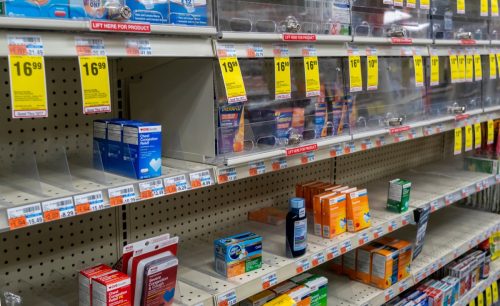Walgreens May "Step Back" From Controversial Security Policies as Shoppers Take Business Elsewhere
A company executive admits they may have gone too far.

The past few years haven't exactly been easy for retailers, as the COVID pandemic and record-breaking inflation both kept shoppers away from stores. They've also been dealing with a significant rise in shoplifting, which some say has made it harder to turn a profit. The average retailer saw organized retail crime (ORC) incidents increase by 26.5 percent in 2021, according to the National Retail Federation (NRF). In trying to stave off shoplifting, however, some companies have been alienating their loyal customers. And now, Walgreens is revisiting its controversial security policies amid reports of shoppers taking their business elsewhere. Read on to find out why the retailer may be changing course.
READ THIS NEXT: Walgreens and CVS Are Closing Pharmacies and Cutting Back on Hours.
Stores have been locking up products to combat rising retail theft.

Retail chains across the U.S. have been battling the surge in shoplifting through new security measures, including locking up products within stores.
During The Wall Street Journal's CEO Council Summit last month, Walgreens CEO Roz Brewer confirmed that the company has been locking up more products and working with other retailers on ways to combat organized theft rings.
At the time, Brewer said that Walgreens was having some success in cutting down on shoplifting, but also revealed that the company was taking things further. While Walgreens was initially focused on locking down high-price items exclusively, the retailer now secures entire product categories, according to the CEO. "What they do is come in and take one elbow and swipe the whole counter," Brewer explained.
Shoppers have started to express their frustration.

Walgreens is not the only retailer that has been putting products behind bars. In 2022, Walmart also began testing new types of locked cases that can only be opened by employees using a smartphone, according to Forbes. And viral videos have revealed everything from shampoo and conditioner to soda bottles being kept behind locked cases at CVS stores.
This strategy has forced some shoppers to take their business elsewhere. Arizona resident Roger Evans told Insider that he has stopped buying products like razors at Walgreens and CVS stores as a result of these new security policies.
"I always found it difficult to find a staff member to come unlock them," Evans told the news outlet, explaining that he now chooses to purchase from direct-to-consumer brands like Harry's and Dollar Shave Club. "The drug stores have been perpetually understaffed."
There are endless social media posts expressing outrage and frustration at these policies. "My local Walgreens (Chicago) have their toothpaste under lock and key. I guess it prevents theft but it also makes it so I'll never buy toothpaste at Walgreens because it's too much trouble to get someone to unlock the case. I'm going somewhere else," one Twitter user wrote on Jan. 5.
Another user said they've also stopped buying products at the popular drugstore chain for the same reason. "The number of times I've walked out of Walgreens with nothing because half of what I needed was locked up," they tweeted. "How do they stay in business?"
RELATED: For more up-to-date information, sign up for our daily newsletter.
Now, Walgreens says it may "step back" from its controversial policies.

When Best Life previously reached out to Walgreens about customer complaints over locked up products, the company said retail crime is "one of the top challenges" right now and doubled-down on its commitment to "providing safe environments" with various security policies.
"We continue to take measures, like installing anti-theft devices for example, to deter theft and ensure safety and security in our stores," a Walgreens spokesperson wrote in a statement. "These steps are taken in response to theft data and for that reason only, and these additional security measures allow us to improve on-shelf availability of products to customers."
But now, it appears Walgreens may be reconsidering. During an earnings call on Jan. 5, CFO James Kehoe acknowledged that the company might have taken its anti-shoplifting efforts too far. "We've put in incremental security in the stores in the first quarter," Kehoe said during the call. "Actually, probably we put in too much, and we might step back a little bit from that."
In a statement to Best Life, a spokesperson for Walgreens did not elaborate on how the company might reverse course, but did say, "Although we are pleased to see retail shrink levels stabilize, this is still a serious national problem affecting all retailers. We have taken a number of steps to address this issue and, most importantly, protect the safety of our customers and team members, including our highly-valued partnerships with law enforcement and security professionals."
The retailer said losses from retail theft have gone down.

Last year, Kehoe said that Walgreens was facing a substantial increase in retail theft, Insider reported. The company's retail shrink, which is the loss of inventory from things other than sales, shot up by 40 to 50 percent year-to-year, according to the CFO. At the time, Kehoe said that Walgreens' shrink rate was about 3.5 percent, with ORC playing a significant role.
But that number has since dropped to a significantly more stable rate. During the Jan. 5 earnings call, Kehoe said Walgreens' retail shrink is currently around just 2.5 percent. "We're quite happy with where we are … That's well below the prior years level," he noted. "Maybe we cried too much last year when we were hitting numbers that were 3.5 percent of sales."





















